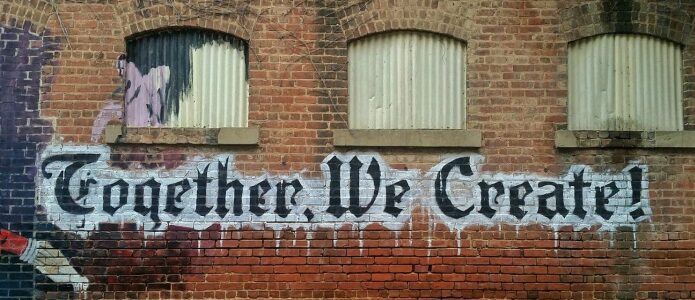Overview of Projects
And we’re off! The commoning projects of the Goethe-Institut
And we’re off! The Goethe institutes in Athens, Belgrade, Bucharest, Sofia, Istanbul, and Zagreb are embracing the commons and trying to get to the bottom of what commoning means, how the commons movement sees itself in the various countries involved, and how we, as an institution, can open up to the commons.
In Athens, the Goethe-Institut is currently developing a new learning workshop for children and teenagers to enable them get to know the commons in a playful way, while also trialling workshops on openness and information literacy. At the same time, our institute, which is soon to reopen, is assembling a collection of relevant media relating to the commons: some of this will be freely available as open access material. In addition, with CLOUDS (Commoning, Learning, Openness, Urbanism, Design, and Structure) the Goethe-Institut in Athens is supporting a collective project initiated by LUDD Open Lab, involving a number of actors in the Athenian commoning world, in order to pilot a toolkit for interventions and events in public space. The production has emerged as a process mediated by commoning and includes sustainable materials wherever possible; at the end of the project, the plans will be made available under an open licence.
Our colleagues in Belgrade are investigating how the art currently on show inside the Goethe-Institut infiltrates public space and how it can become commons. How does art become participatory without degenerating into a spectacle? How can the truth that is experienced through a more artistic process be turned into commons?
Edit-a-thons involving the local Wikipedia community are on the menu in Bucharest. As co-organiser of the Occupy Library Conference in June 2020, the Goethe-Institut, together with the Wikimedia Foundation, is supporting a conference programme that also focuses on open access to knowledge and free software.
In cooperation with the Bulgarian Seed Festival, a series of events is being held in the library at the Goethe-Institut Sofia to give a better idea of the environmental commons. Why are seeds important? To whom do nature and our food “belong”? And how can we preserve and protect historical seeds that are not genetically modified? In Sofia we will also work with Wikipedia once again to address LGBTIQ topics. And finally, a series of workshops will be staged to make the recently converted library more inclusive.
Our institute in Istanbul plans to create an archive on the ecological movement in conjunction with the Ekoloji Kolektifi Derneği ecology collective. Oral history will be used to map the experiences of contemporary witnesses of the ecology movement in Turkey and make them freely available to the public.
The Goethe-Institut in Croatia will be hosting a series of transnational talks, film screenings, and artistic interventions in Zagreb and Rijeka that will critically examine terms like “resource” and “participation” on the margins of the outdated dichotomy between market and state. The aim of the activities, which take a look back at contemporary controversies relating to ecological public welfare, is to create space for discussion of new paradigms modelling more sustainable and fairer ways of living together. As an additional element, a physical toolbox will be created in Zagreb that will sensitise children and teenagers to the theme of “Commons and Commoning”: this will be available to kindergartens, schools, libraries, and other institutional and non-institutional educational facilities.
